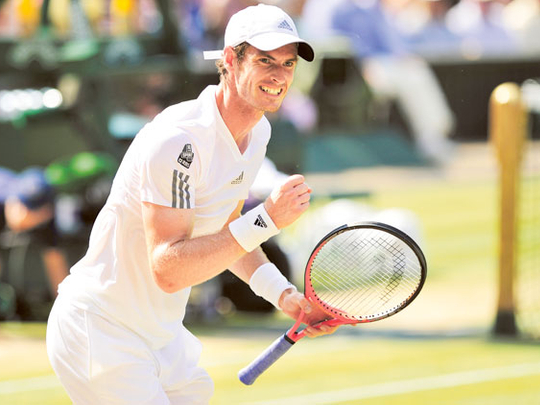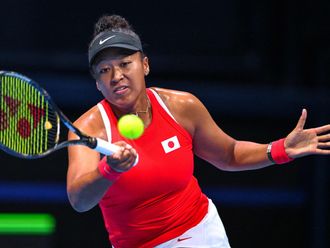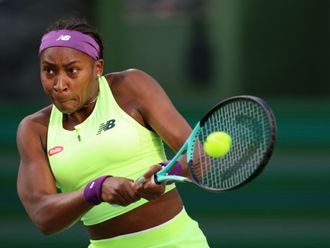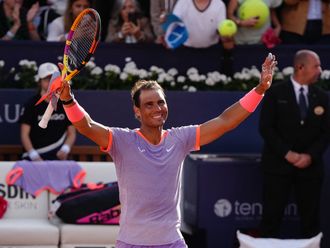
London: A weary but elated Andy Murray said on Monday he is determined to push on from his stunning Wimbledon win and add further grand slam titles to his achievements.
Speaking after a near-sleepless night, Murray returned early morning to his press duties, hailed as a national hero, having become the first British player to lift the gold trophy in 77 years.
His emotion-charged 6-4, 7-5, 6-4 win over top seed Novak Djokovic on a baking-hot centre court on Sunday left the 26-year Scot drained but still lucid over what faces him next in his tennis career.
“I need to try and improve and use this hopefully as a springboard to try and get better,” he told BBC Five Live.
“I may never win another slam, I don’t know, but I’m going to try as hard as I can and keep working hard and not worry about all of the other stuff that comes along with winning Wimbledon, and after a few days I will enjoy this and get back to work. I’m going to try and take a bit of a holiday and go away after the next three or four days. I will see all my family and go out for dinner and see friends and then head off for a week or so,” he said.
Murray said that the whirlwind of media interviews and official duties as a Wimbledon winner had left him in a kind of a daze and that getting to sleep at the end of it all late in the night had been all but impossible.
“No-one could really believe it and I was the same,” he said of his own feelings and that of his family and entourage.
“You don’t want to go to sleep in case you wake up and it didn’t actually happen. I was just messaging my friends and laying in bed. It was tough to get to sleep last night.
“I’m sure I will see some of the newspapers around. I’ve some of the back pages and front pages of the newspapers this morning. I know I won Wimbledon yesterday but what it actually means — I think that will take longer than 24 hours to sink in and understand it,” he said.
Despite the win, his second grand slam triumph after the US Open of last year, where again Djokovic was his victim in the final, but that time in five sets, Murray will remain as world number two behind the Serb.
Replacing Djokovic one day as the top-ranked player is something he aspires to, but Murray says he would not become obsessed by it. “It’s tough,” he said when asked if becoming world number one was his ultimate aim.
“You have to be so consistent throughout the whole year. Right now I hold two slams, the Olympic gold and the final of another slam and I’m still nowhere near number one in the world. The goal for me is to try and win the grand slams, win those tournaments and not worry too much about the ranking.”
KNIGHTHOOD RUMOURS
Murray’s historic win sparked immediate speculation that he would be awarded a knighthood by the queen for his achievement.
Prime Minister David Cameron, who watched the final from the centre court Royal Court, said that he could think of no-one who was more deserving of such an honour. He said Murray’s victory had “lifted the spirits of the whole country”.
Asked about the possibility, Murray remained coy saying that he was not sure he was worthy of it. “It’s a nice thing to have or be offered. I think just because everyone’s waited for such a long time for this, that’s probably why it will be suggested but I don’t know if it merits that,” he said.
On Sunday, before the start of the men’s final, fans in broad-brimmed hats and sunscreen stopped as usual to pose for pictures and pay tribute at the bronze statue of Ferry Perry the last British man to win Wimbledon before Murray 77 years ago, just outside Centre Court. A debonair Englishman, Perry won the last of his three Wimbledon singles titles in 1936. But by late afternoon, with shadows extending across the game’s most historic court, he no longer stood alone.
“That last game will be the toughest game I’ll play in my career, ever,” Murray said.
After such a lengthy vigil, it was reasonable to expect something extraordinary: a back flip, a rainbow, a Centre Court conga line, perhaps a spontaneous and perfectly pitched “God Save the Queen” from the crowd.
But the celebration — tinged with relief — stuck to the now-customary climb into the player box and the jacket-and-tie protocol that has long applied to the trophy ceremony.
The winner, however, was an original, and not just because he was the first British man to win this title in shorts.
“Somebody had to break this elusive, holy grail type of thing, and I’m glad it was Murray,” said Pat Cash, the former Wimbledon champion from Australia who has lived in Britain for nearly 30 years. “You needed a tough, gritty kid to do it. He may not be the perfect, Tim Henman-type English guy with a middle-class upbringing. He’s a gritty young Scotsman, and you need a bit of that attitude to win these things.”
After Djokovic’s backhand struck the net, Murray stripped off his cap, pumped both fists in the direction of the stands and eventually dropped to the grass, pitching forward into a crouch, alone with his thoughts and consummated dreams.
Murray then rose and shook hands with and embraced Djokovic, an old friend and rival. He later made his way to the players box to embrace his family, friends and extensive support team, including his coach, Ivan Lendl. He nearly forgot his mother and boyhood coach, Judy Murray, before reversing course and hugging her, too.
UNLIKELY DESTINATION
Then came the once-perilous on-court interview, where Murray had broken down, microphone in hand, after losing a lead and the final to Roger Federer last year.
“It feels slightly different to last year,” Murray said, proving that understatement extends to Scotland. “Last year was one of the toughest moments of my career, so to manage to win the tournament today, it was an unbelievably tough match.”
It has not been 77 years since a British player won at Wimbledon. Virginia Wade won the women’s singles title in 1977. But the British men kept swinging and missing until Murray finally arrived: a once-in-a-generation talent from the unlikely tennis destination of Dunblane.
The town was better known for tragedy than triumph until Murray’s achievements because of a massacre at his primary school in March 1996, when a gunman shot and killed 16 students and a teacher.
But even if Murray is proudly Scottish in a time of political division between Scotland and England, he is now in the habit of making his whole nation proud.
“It’s incredibly difficult to win these events,” he said. “I don’t think that’s that well understood sometimes. It takes so much hard work, mental toughness.”
If Sunday’s final seemed to lack the full-force emotional impact that a 77-year wait would suggest, that is perhaps attributable to Murray’s achievements in the last year.
After losing in last year’s Wimbledon final, he came back to win the Olympic gold medal at the All England Club. He then won his first Grand Slam singles title — after four straight losses in finals — at the Us Open.
The Murray who returned to Wimbledon this year was more settled and confident. His draw, in terms of his opponents’ rankings, was a stroll. But he had to deal with greatness in the flexible form of Djokovic, who had beaten him 11 times in 18 matches and three times in a row.
Murray and Djokovic were born a week apart, and their games, athleticism and staying power are now so similar that to watch them play is to watch equal forces canceling each other out. There is, for now, more hard labor than high art in their rivalry. The rallies ON Sunday were long and exhausting, the territory excruciatingly difficult to conquer, the tactical solutions largely unclear. This straight-set match lasted 3 hours 9 minutes for a reason.
But after 77 years, and on the 7th day of the 7th month, the pressure has been released.
“I think now it will become easier,” Murray said. “I hope it will.”












